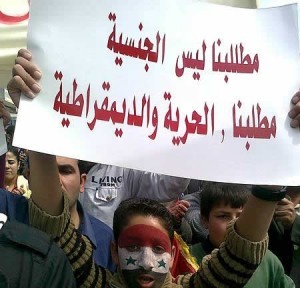Naturalised Kurds Exempted Military Service

Throughout the revolution, the Syrian regime has tried to win over minorities by attempting to gain their trust and push them into believing that their own future depends on its survival.
The Kurds were the main target of these flirtations. At the start of the revolution, they were granted Syrian citizenship after having been deprived of this right for nearly half a century. The regime’s attempt to win the Kurds’ hearts and minds, however, was clearly to no avail because demonstrations in their areas did not stop.
The government’s decision was ambiguous and left many Kurds feeling anxious, particularly those who feared the possibility of being forced into compulsory conscription while the country is still going through difficult times. The regime, for its part, did not reveal its intentions towards the newly naturalised. There were rumors that those below the age of 42 would be required to perform military service, which was a cause for wide resentment that pushed youth to stage sit-ins in front of official administrative offices in areas such as Al Malikiyya, Al Dirbasiyya and Amuda.
Kurdish protestors threatened to disobey any law forcing them to perform this mandatory duty, but also asked the regime for indemnities to remedy the injustice they endured for 50 years, during which their lands were confiscated and given to the Ghamar clans.
But the regime took another step to draw the Kurds closer. The Syrian authorities issued a decree last December stipulating that naturalised Kurds who are 20 years of age or older will be relieved from military service. According to the same decree, this service was enforced upon those born in 1993 and the years prior to it, but who will not have to report to duty before another year.
This official decision was reassuring for many naturalised Kurds, who considered it that it gave them lawful rights.
“I joined all the camps [that offer training] that count as mandatory service during university, and it’s not our fault that we were born deprived of citizenship,” says Javan, a 29 year-old physician. “It is the regime’s fault [because] it never treated us like the rest of society’s constituents; had we been citizens since birth we would have [performed] military service.”
Javan thinks it was “normal” to issue this decree in order to compensate the Kurds for unjust laws that deprived them of several rights that any regular citizen should enjoy, adding that the decree will not change the Kurds’ views of the regime’s crimes.
“We will carry on the struggle alongside our […] brothers in this country,” he said.
Khaled, a 33 year-old worker, also welcomed this decision, but he believes that it should not be seen as a debt to be repaid by siding with the regime. More importantly, Khaled thinks that the regime did not willingly grant Kurds their rights.
“If it wasn’t for the mobilisation in the street we would have waited for another half a century,” he said. “I have four children and they’re all girls; I’m their sole provider. If I went to do my military service, who would take care of my home and children? If I hadn’t been deprived of my citizenship I would have completed my service 13 years ago,” he added.
Ali, a man in his forties, does not deny that the decision to reinstate the right of Kurds to citizenship boosted his as well as others’ morale.
“But this decree should not compel us to be a mouthpiece of the regime,” he said. “It was the regime that divested us [of citizenship] and hence deprived us from [performing] military service; it had to take responsibility for its foolishness when it took away from us a right guaranteed by all societies of the world. With this decision, the regime has tried to win the Kurdish voice over to its side, but our people will not be […] stupid and let the regime take [advantage of them].”
Adel, 55, is also happy with the issuance of the decree.
“I have three young sons who are all in their thirties and if it wasn’t for this [decision] I would have had to send all three of them to [perform military] service,” he said. “I think this decision is both right and brave. From a personal point of view it’s good for me and my sons,” he added. “My concern is that the bloodshed we see stops. I am scared that this area would turn into a zone of confrontation with the regime because it has a wide spectrum of sects and minorities, and igniting a civil war in it is not difficult.”
Being relieved of military service under the circumstances of the revolution is a lawful right, according to civil rights activist Maysam Haq, because the fate of those who join the army is unknown, especially if they are sent to security hotspots.
“They will either kill their people or be killed by [the regime’s thugs] shabbiha if they disobey orders to fire at civilians,” he said.
